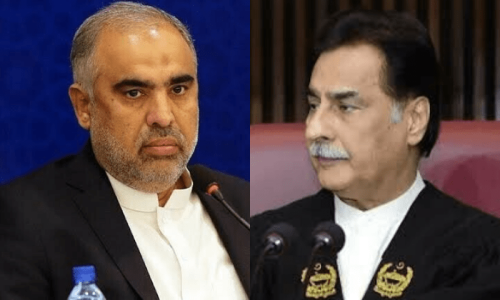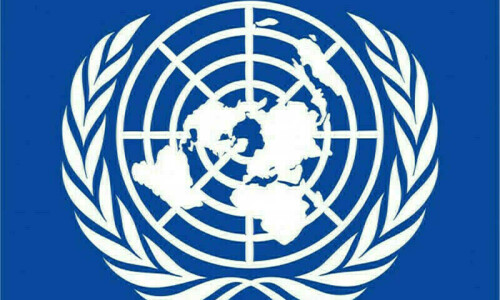NEW DELHI, Oct 4: US Secretary of State Condoleezza Rice nudged India on Saturday to become good friends and said Washington had a stake in Islamabad’s civilian government to succeed in the war against terrorism.
“We have stakes in a successful civilian government in Pakistan,” Ms Rice told a joint news conference here with Indian Foreign Minister Pranab Mukherjee. “We all have an interest in controlling terrorism in the region.”
She said the United States had encouraged cooperation between India and Pakistan. “A good relationship between India and Pakistan is going to help” in combating cross border terrorism.
In New Delhi to celebrate the endorsement of the US-India nuclear deal by the US Congress, Ms Rice took the opportunity to discuss other raging issues. She said the two sides also discussed the situation in Afghanistan. “We have a joint desire to see Afghanistan peaceful and prosperous,” said Ms Rice, who was to fly to Kazakhstan from New Delhi.
Mr Mukherjee too underscored the importance of tackling terrorism in the region.
He referred to Indian Prime Minister Manmohan Singh’s meeting with President Asif Ali Zardari on the sidelines of the UN General Assembly in New York a week ago and said the Pakistan president had given an assurance that his country’s territory will not be allowed to be used for terrorist activities against India.
“We have a joint anti-terror mechanism to deal with the issue. We hope the joint mechanism will be effective in dealing with the issue,” Mr Mukherjee said.
India and Pakistan are to hold a special meeting of the anti-terror mechanism later this month. It seeks to address New Delhi’s concerns about Pakistan spy agency ISI’s alleged complicity in the July 7 bombing of the Indian mission in Kabul.
AP adds: Ms Rice had arrived here to commemorate — but not sign — a historic deal that opens up US nuclear trade with India.
A signing ceremony that had been scheduled was dropped because, according to US officials, a series of administrative steps have yet to be taken in Washington following Senate approval of authorising legislation on Wednesday.
Speaking to journalists aboard her plane en route from Washington, Ms Rice said she expects the civil nuclear cooperation agreement will trigger an across-the-board expansion of American-Indian relations.
She said only administrative — not substantive — matters were delaying the signing of the agreement.
US President George W. Bush has yet to sign the authorising legislation, and once he does he is required to certify that the agreement with India is consistent with US obligations under the Nuclear Non-Proliferation Treaty, designed to limit the spread of nuclear weapons. He must also certify that it is US policy to cooperate with international efforts to further restrict transfers of technology related to uranium enrichment and the reprocessing of spent nuclear fuel.
The agreement on civil nuclear cooperation allows American businesses to begin selling nuclear fuel, technology and reactors to India in exchange for safeguards and UN inspections at India’s civilian — but not military — nuclear plants.
Critics in India argue the constraints compromise their country’s right to conduct nuclear bomb tests.
Even without a signing ceremony during her visit, Ms Rice said, “I’m going to draw a line under this” deal “one way or another because it’s time to put the historic agreement — to say that that’s done and move on to what else we can do” to strengthen and broaden the relationship.
The Bush administration considers the deal only crowning achievement of the president’s second term in office.
In the onboard interview, Ms Rice stressed that she saw the importance of her visit to New Delhi as focusing on the future, rather than celebrating the completion of the civil nuclear agreement.
“This is a relationship that has now a firm foundation to reach its full potential,” she said. “It removes for India a barrier to full integration on a whole range of technologies” and opens the way for closer US-India cooperation in other areas such as defence, agriculture and education, she said.













































Dear visitor, the comments section is undergoing an overhaul and will return soon.